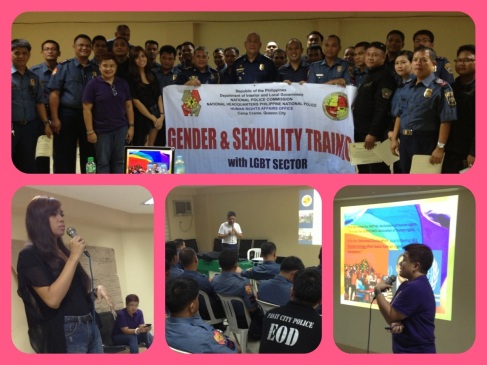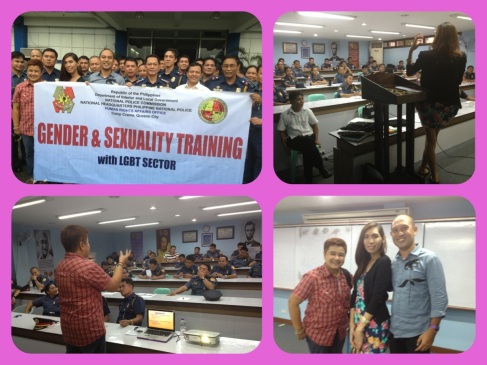Reflections after five LGBT sexuality training sessions with officers of the Philippine National Police
We have had five “Gender and Sexuality Training” days so far—the first one in Caloocan on April 10, followed by one in Pasay April 26, then Pasay again May 20, Quezon City May 21, and just today, May 23, Makati. In every instance, the training starts off with blue-uniformed police officers sitting ramrod straight, stoically listening to their superior officers opening the session, not quite knowing what to expect from the rest of the day. Then Ging Cristobal comes in with her first workshop activity, a lesbian lecturer entering the lions’ den, as it were. Within a few minutes, she has the room shouting “Darna!” in cheerful unison, and the ice is broken.
That the PNP Human Rights Affairs Office is providing LGBT sensitivity training to police officers on the district and precinct level is nothing short of historic. While no doubt the police have always been aware of the habits, behavior, and proclivities of LGBT Filipinos, this is the first time that actual LGBT persons themselves are going around directly addressing police officers, speaking as resource persons explaining themselves and their sector to the predominantly heterosexual police force. A “macho” culture still pervades the PNP, just like the country in which it operates, and it is very likely that many, if not most, of the police officers attending must have suspected that the training would be a waste of their time.
After five such trainings, I can most definitely say that their time has not been wasted. The training introduces the officers to the concept of gender identity, as distinguished from sexual orientation, and this is completely new to most of them. They are unfamiliar with the word “transgender.” Ging and I have to say repeatedly that “a transgender person is not necessarily bakla” before these new ideas actually sink in. The police are very curious about transgender persons. They ask many questions, some of them bordering on rude and insensitive.
But the sessions are “no holds barred,” and every question is entertained and answered. The police enjoy our candor and honesty, and they reciprocate accordingly. They pepper us with questions. Why are there gay people? Where do they come from? How can bisexuals be truly happy? Is it true lesbians will kill for love? What do transgender women have down there? You get the idea.
It helps that Ging and I are unperturbed by these questions. Lots of laughter punctuate the discussions, much of them naughty and mildly offensive. But we do not shush them; in fact, we encourage the jokes, because it helps that the police remain completely candid about their views and ideas about LGBT persons, allowing misconceptions and prejudices to rise to the surface, the better to dispel or correct them immediately. The police appreciate our openness, and the exchange of ideas is more robust and healthy as a result. They are more receptive because they must sense that Ging and I are speaking from a position of expertise and experience, while remaining relaxed and non-threatening.
After the LGBT 101 lectures, invited LGBT speakers come and share their personal struggles growing up in the Philippines. For the first five sessions, we have invited four different transgender women, while Ging has spoken as a lesbian, and I as a gay man. These talks have been deeply personal, and tears have intruded every now and then. Many LGBT persons have gone through painful, difficult experiences growing up, and it is not easy baring one’s soul to the roomful of policemen. But the room remains quiet and attentive mostly, respectful of the stories being shared. Perhaps many in the audience are feeling the pain and anguish of being LGBT for the first time.
After the talks, the police officers are given the opportunity to share their reactions. This is my favorite part of the day, because I always end up being surprised by one or two piquant or poignant comments. A female police officer murmured, “I belong to L,” which left us bewildered for a while, until we realized later that she was actually coming out to the group. A father confessed that because of the talks he now understood his gay son’s anguish and resolved to love him unconditionally. A macho-looking policeman declared that in addition to treating LGBT persons with respect he would like to add that they be treated “with love.” A policewoman’s eyes turned red with repressed tears as she thought of her effeminate teenage son and listened as we told her that there was nothing wrong if her son turned out to be gay and that her duty as mother was to love her child regardless.
It still stings a bit when I remember Ladlad’s sad fate in the recent elections. I really would have liked to have been the voice for LGBT Filipinos in Congress, to fight for them and be their champion. But this was not to be. My consolation is that, through this series of trainings, I am reaching out, together with my incredible partner-in-crime Ging, to persons who are in power now, police officers dealing with LGBT Filipinos on a daily basis, and somehow we are bringing positive change to the relations between these two groups. We have had more than 200 participants so far, and I have been told by an American friend that he was surprised to meet a police officer in a poor, remote corner of Caloocan recite to him what “LGBT” stood for, saying that he learned that from a recent seminar and displaying more sensitivity to my friend’s LGBT companion. It’s working, yes! The trainings are not a waste of time.
Ladlad may have lost, but the struggle for LGBT equality goes on, as long as we believe in our individual capacity to change the world, one person at a time.


about time for our police force to have this kind of LGBT awareness and training! 🙂
This is inspiring. I hope you bring your voice everywhere!